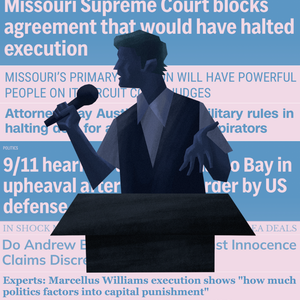
On December 22, 2023, the Oklahoma Court of Criminal Appeals issued a 100-day stay of execution to carry out a mental competency hearing for James Ryder, who was scheduled to be executed on February 1, 2024. Mr. Ryder’s attorneys have argued for years that he is not competent to face execution, citing long standing mental illness that has worsened throughout his incarceration. Several psychologists have diagnosed Mr. Ryder with paranoid schizophrenia and concluded he is not competent to face execution. “Having reviewed the evidence, we find the matter should be remanded to the District Court of Pittsburg County for a hearing to determine whether [Mr.] Ryder ‘has raised substantial doubt as to his competency to be executed,’” wrote the appellate court in its order. Attorney General Gentner Drummond’s office did not oppose Mr. Ryder’s attorneys request for a competency hearing, but his office “plan[s] to present evidence in support of Mr. Ryder’s competency to be executed.”
The Constitution forbids the execution of an individual who is “insane” and deemed mentally incompetent. A prisoner is considered mentally incompetent to be executed if they do not have a rational understanding that they are going to be executed and the reasons for their execution. In 2022, Dr. Barry Crown, a neuropsychologist retained by Mr. Ryder’s defense team, evaluated Mr. Ryder, and identified signs of significant mental illness as well as cognitive problems and delusional fixations. Mr. Ryder’s “mental power has been wholly obliterated. He is unable to comprehend or process, in any fashion, the reason he is to be executed and that the execution is imminent,” wrote Dr. Crown. Jim Farris, the warden of the prison where Mr. Ryder is housed, wrote a letter to the local district attorney’s office in 2022 expressing his concern about Mr. Ryder’s mental state. He believes that Mr. Ryder “may have become insane during his incarceration at the Oklahoma State Penitentiary.”
There are longstanding concerns regarding the effect of death row conditions of confinement on prisoners, and as time spent on death row has increased, these concerns have intensified. In 2023, prisoners who were executed spent an average of 23 years in prison, the longest average time since executions resumed in 1976. International human rights law strictly limits the use of solitary confinement, classifying its long-term use as torturous and cruel, yet most individuals on death row are held in solitary confinement for many years and even decades. The United Nations Standard Minimum Rules for the Treatment of Prisoners considers solitary confinement to be “the confinement of prisoners for 22 hours or more a day without meaningful contact” and says it should not be used for more than 15 consecutive days. Mr. Ryder has been incarcerated since 1999 and has spent 24 years on death row.
Emma Rolls, the Chief of the Capital Habeas Unit at the Federal Public Defender for the Western District of Oklahoma believes the evidence supporting Mr. Ryder’s incompetence is clear. “He is extremely paranoid. He has fixed delusions. Any conversation you have with him, it becomes clear that he believes his death sentence results from some sort of conspiracy involving politicians, the central World Bank and the manufacturers of execution drugs.” An evidentiary hearing will now be scheduled to determine whether Mr. Ryder’s mental state will prohibit his execution from being rescheduled.
Sean Murphy, Oklahoma’s next lethal injection delayed for 100 days for competency hearing, Associated Press, January 3, 2024.
Oklahoma
Oct 04, 2024


